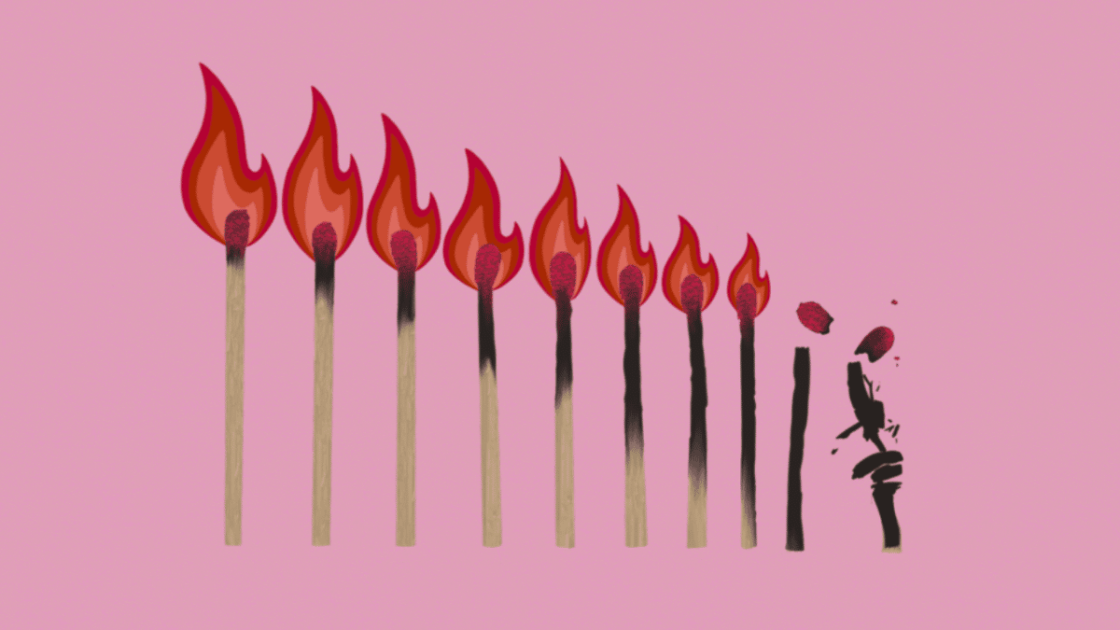How to tell if you’re burnt out
Exhaustion that is not cured by resting, becoming detached from things you care about and feeling you are unable to achieve much are three main signs of burnout.

While burnout is a phrase that is regularly used in conversations, it is often confused with other similar experiences. It is important to learn to recognise the signs of burnout so that you can seek the right support if you need it.
What is burnout?
Burnout is a state of physical, mental, and emotional exhaustion caused by too much stress over a long period of time.
Burnout is not recognised as a diagnosable mental health condition in Ireland, but it can lead to physical and mental health issues. It can also be experienced alongside mental health conditions such as depression and anxiety.
What causes burnout?
Burnout usually develops slowly over time in response to constant or chronic stress. Stress is the reaction of your mind and body to something that is considered a threat or challenge.
There are many factors that contribute to burnout, and everyone will experience it differently. Find out more about what causes burnout.
How to know if you’re experiencing signs of burnout
The phrase “burnt out” is commonly used by people who are feeling very tired after a busy time. While exhaustion is always experienced when someone is burnt out, it is possible to be extremely tired without actually being burnt out.
It is normal to feel tired after a particularly busy or stressful period in life. However, with regular tiredness or stress, you will usually feel better after resting and practicing self-care. This is not the case with burnout.
The main signs of burnout are:
- Complete exhaustion that is not relieved by resting
- Cynicism (negativity towards things you once cared about) and/or depersonalisation (the feeling of being separated from or outside your body)
- The feeling that you are unable to achieve much
Signs of burnout
The main signs of burnout offer an idea of what it is, but the lived experience of burnout can vary from person to person. These are some signs of burnout to look out for:
- Feeling tired and drained all of the time
- Headaches and muscle pain
- Frequent illness
- Changes in appetite
- Changes in sleep patterns
- Loss of motivation
- Negative outlook
- Sense of failure and self-doubt
- Feeling alone in the world
- Decreased satisfaction and sense of accomplishment
- Feeling helpless and trapped
- Withdrawing from responsibilities
- Isolating from others
- Procrastination
- Using food, alcohol or drugs to cope
- Taking frustrations out on others
- Skipping responsibilities like work or education
If you are experiencing some of the signs of burnout listed above, it is a good idea to seek support. It is possible that you are experiencing another health challenge and could benefit from professional help.
It is likely that you will experience small, subtle signs before you experience burnout. Learning to spot those signs and deal with stress early on can help you to avoid burnout. Find out more about how to prevent burnout.
Does burnout only happen at work?
Our knowledge of burnout is growing. Burnout was first discovered and studied in the work environment. At that time, it was thought to only affect people who work in caring professions such as nursing and teaching. Burnout is now described by the World Health Organisation as an ‘occupational phenomenon’ resulting from chronic workplace stress that has not been successfully managed. However, many experts now agree that burnout is not only work-related. You can experience chronic stress in any environment. It is often a combination of stressors across multiple areas of someone’s life that leads to burnout. It is possible to experience burnout if you are a student, a parent, a caregiver or anyone who experiences stress that is not managed.
What is the difference between burnout and depression?
Burnout and depression share some similar signs. It is important not to self-diagnose. Doing so could make it more difficult to get the support you need.
There are some differences between burnout and depression:
- Depression is a mental illness, while burnout is not a diagnosable mental illness
- Burnout happens as a result of ongoing stress, while depression doesn’t always have a trigger
- Depression reduces your overall sense of self-esteem
- Depersonalisation is more common in burnout
- Burnout develops in stages, while depression does not usually develop in the same linear manner
Feeling overwhelmed and want to talk to someone?
- Get anonymous support 24/7 with our text message support service
- Connect with a trained volunteer who will listen to you, and help you to move forward feeling better
- Whatsapp us now or free-text SPUNOUT to 50808 to begin.
- Find out more about our text message support service
If you are a customer of the 48 or An Post network or cannot get through using the ‘50808’ short code please text HELLO to 086 1800 280 (standard message rates may apply). Some smaller networks do not support short codes like ‘50808’.






